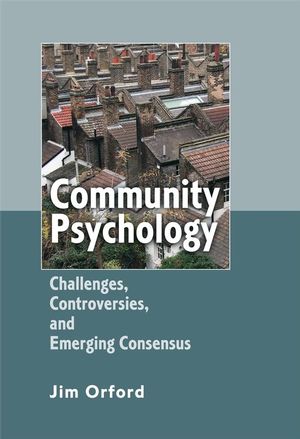Community Psychology: Challenges, Controversies and Emerging ConsensusISBN: 978-0-470-85593-5
Hardcover
482 pages
April 2008
 This is a Print-on-Demand title. It will be printed specifically to fill your order. Please allow an additional 15-20 days delivery time. The book is not returnable.
Other Available Formats: Paperback
|
||||||
Preface.
Acknowledgements.
PART I: THE BACKGROUND TO COMMUNITY PSYCHOLOGY AND WHAT IT STANDS FOR.
1. Challenging Psychology Over its Neglect of the Social.
The individualism of psychology.
The new public health psychology.
Critical psychology.
2 Community Psychology’s Core Values: Empowerment, Liberation and Social Justice.
Empowerment.
Social constructionism and its critics.
Liberation psychology.
Social justice as a core value.
3. The Debate over Knowledge in Community Psychology.
Dissatisfaction with existing research methods.
Support for qualitative research.
Participatory and action research.
Negotiating the community psychology researcher’s role.
What kind of science is community psychology?
PART II: UNDERSTANDING INEQUALITY AND ITS EFFECTS ON HEALTH.
4. Social Position and Inequalities in Health.
The accumulation of evidence that health is related to social position.
'Social class’: complexities and controversies.
Inequality of income distribution.
Psychosocial versus material explanations.
5. Place and its Influence on Health and Well-being.
Evidence for the influence of area on health and well-being.
How neighbourhoods may (fail to) meet local health needs.
6. Two Concepts for Understanding Inequalities by Position and Place.
Social capital.
Sense of community.
PART III: THE EXPERIENCE OF DISEMPOWERMENT: SEVEN EXAMPLES.
7. Disempowerment by War, Immigration, Homelessness or Unemployment.
Communities caught up in war and its consequences.
Groups of people adjusting to a new country.
Experiencing homelessness.
The unemployed and the under-employed.
8. Disempowered Because of Income, Gender, or Sexual Orientation.
The poor and socially excluded.
Women.
Lesbian, gay, bisexual and transgendered people.
PART IV: COMMUNITY PSYCHOLOGY ACTION: FROM SUPPORT TO LIBERATION.
9. Strengthening Social Support for Members of Disempowered Groups.
Social support for young people.
Social support interventions for women.
Support for those with illness or disability or for their families.
Responding to domestic violence.
Support for LGBT groups.
10. Social Action and Innovation.
Moving to collective social action.
Experimental social innovation and dissemination.
11. Empowering Communities.
The theory of community coalitions.
Collaborations, consortia and coalitions: examples of projects.
Young people and collective action.
12. Participation and Liberation.
Participation in local action.
Drawing on a diversity of world views.
Projects to protect and sustain natural resources.
Towards liberation for the poor and oppressed.
Finale – Consensus and Challenge.
References.
Author Index.
Subject Index.



